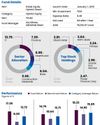
Financial planning for retirement can be broadly divided into two phases: the accumulation phase when you are earning, saving and investing, and the decumulation phase, when you are drawing from your investment kitty. There are also sub-parts to this: during the accumulation phase, there are multiple financial goals on which you spend money, and for which you need to plan. But between these two phases, there is also the consolidation phase. Here, say from age 55 to 60, you gradually move from riskier assets, which are more volatile, to the defensive assets to de-risk your portfolio in your golden years after retirement.
Let’s see how fixed-income funds can help you in the financial planning process in this stage.
What They Offer
Stability: Returns from fixed-income funds are relatively more stable than equity funds. The reason is that fixed-income instruments, such as bonds or bank deposits have a known rate of interest, which is taken into account in the daily net asset value (NAV) computation. This is, however, not the case with equity funds, where dividend is taken in the NAV only when it is paid. Price volatility in the equity market is also relatively higher, which makes the NAVs of equity funds fluctuate more. Hence, you should invest a part of your portfolio in fixed-income funds for stability.
Visibility: Fixed income assets give better clarity on the amount and timing of cash inflows. For instance, bonds have a defined maturity date and amount, while in case of mutual funds, target maturity funds (TMFs) have a defined maturity date and an estimate of the returns, which is somewhere around the initial portfolio yield-to-maturity (YTM). YTM data for funds are available in the monthly factsheet.
This story is from the {{IssueName}} edition of {{MagazineName}}.
Start your 7-day Magzter GOLD free trial to access thousands of curated premium stories, and 9,000+ magazines and newspapers.
Already a subscriber ? Sign In
This story is from the {{IssueName}} edition of {{MagazineName}}.
Start your 7-day Magzter GOLD free trial to access thousands of curated premium stories, and 9,000+ magazines and newspapers.
Already a subscriber? Sign In

BUDGET & YOU: NEW REGIME BEATS OLD IN FY26
Lower tax slabs and nil tax on incomes up to 12 lakh has not only provided relief to middle-class families but also rendered the old tax regime irrelevant for most of them. The government also renewed its focus on senior citizens

Consistent Returns In Hybrid Space
The Indian equity market is going through rough waters, leaving investors uncertain about whether to choose equity or fixed-income investments. Experts, meanwhile, predict higher volatility and recommend a safer approach.

BEHIND THE MIND GAMES THAT END IN 'DIGITAL ARREST'
The new scam of digital arrest employs psychological pressure to dupe vulnerable victims, who go through a phase of trauma and fear. We tell you how it works, whether the government is doing enough to curb the menace, and how you can keep yourself safe

Boost To Consumption, But Don't Buy Blindly
With the budget putting more money into the hands of people to boost consumption and increasing foreign direct investment in insurance, certain consumer-oriented sectors, such as FMCG, auto, as well as manufacturing are expected to do well, but think before investing

Pre-Existing Diseases In Insurance
Understanding pre-existing diseases (PEDS) in health insurance is crucial because they can affect your coverage and premiums. Pre-existing conditions, such as diabetes or heart disease, are health issues you may already have and know of before purchasing insurance.

'Govts Are Often Influenced By Private Interests, And Don't Focus On Health'
Longevity is not about going to the gym or having superfoods, but living in an environment that promotes a healthy lifestyle. Dan Buettner, the Blue Zones founder, National Geographic fellow, best-selling author and the producer of the Emmy Award-winning 'Live to 100: Secrets of the Blue Zone' series, learnt this during his decades-long research into five blue zones of the world. In an interview with Nidhi Sinha, Editor, Outlook Money, as part of the Wealth Wizards series, he talks about another kind of wealth, a healthy and fulfilling long life. He also talks about blue zones, and how policy matters when it comes to improving the health, lifestyle and longevity of the population

The 'Gap' In Long-Term Returns
There is a significant gap in the nominal and inflation-adjusted returns across asset classes. So, reading long-term trends is important before making investing decisions

Changed Jobs? Where is Your EPF Money?
For many employees, transfer of EPF becomes a nightmare when changing jobs. We give you the likely problem scenarios and what you should do for a seamless transfer of your EPF upon changing jobs and states

Old-New Break-Even Point Is High
The break-even point for deductions to choose between the old and new tax regimes has increased to ₹8.50 lakh for income of ₹24.75 lakh and above. Normally, deductions and exemptions commonly claimed by salaried individuals do not exceed ₹8.50 lakh

How Not To Be Financially Vulnerable
We often naïvely assume that our monthly pay cheques will cover whatever life throws our way. But it may not cover all our emergencies, which is why we need to create a safety net